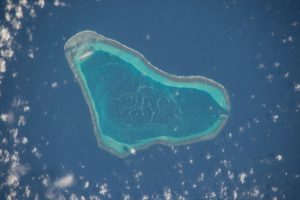The China Coast Guard (CCG) yesterday held a National Day flag-raising ceremony on a ship in the waters close to Scarborough Shoal, a South China Sea atoll that has been a focus of a string of recent maritime clashes with the Philippines.
A National Day message broadcast by the state television station CCTV vowed to defend China’s control over the atoll, which Beijing refers to as Huangyan Dao. The South China Morning Post (SCMP) reported that in the video, CCG officer Chen Zhijie said that protecting the disputed island was his “sacred duty and glorious mission,” pledging to “perform our duties conscientiously and contribute our utmost to protecting our country’s territorial sovereignty.”
Reuters also referenced a video posted by the CCG on the social media network Douyin, presumably the same one, showing CCG officers standing in formation on the rear deck of a patrol vessel, who saluted as the Chinese flag was raised. “We stand guard over these blue waters, assuring the nation of our unwavering commitment,” the video subtitles read.
Scarborough Shoal, a triangular atoll about 222 kilometers west of the Philippines’ Luzon island, has been under de facto Chinese control since a protracted stand-off between the two countries in 2012. It has also been the locus of frequent disputes over the past few years, most of them focusing on Chinese efforts to prevent Filipino fishermen from entering the shoal’s internal lagoon.
The most recent of these was a serious incident in which two Chinese vessels collided with each other while pursuing a Philippine Coast Guard patrol vessel around 10.5 nautical miles east of the shoal. This embarrassing incident, which Beijing has not formally acknowledged, has prompted renewed Chinese attempts to reinforce its presence at Scarborough Shoal, including strengthened patrols.
Last month, China’s State Council also approved a proposal to establish a national nature reserve at the atoll. China’s National Forestry and Grassland Administration says that the reserve, which will cover more than 3,500 hectares on the shoal, is intended to protect its fragile coral reef ecosystem.
However, critical observers say that Beijing’s establishment of a nature reserve is a covert means of asserting its sovereignty over the shoal, a claim that was ruled unlawful by an arbitral tribunal in The Hague in 2016.
For its own part, the Philippines said that it “strongly protests” the move, arguing that Scarborough Shoal “is a longstanding and integral part of the Philippines over which it has sovereignty and jurisdiction.” For this reason, it argued that the Philippines “has the exclusive authority to establish environmental protection areas over its territory and relevant maritime zones.”
Sure enough, Zhang Yancang, the director of the Yellow Sea and Bohai Sea Research Institute at Dalian Maritime University, subsequently told CCTV that the establishment of the nature reserve would lead China to boost its routine patrol presence around Scarborough Shoal.
“Unlike previous patrols, the patrols from now on will focus more on being routine and regular,” he was quoted as saying by Yuyuan Tantian, a social media account affiliated with state broadcaster CCTV, the SCMP reported on September 12. This would mean “daily patrols not only by coastguard vessels but also aircraft, drones and even uncrewed boats,” the SCMP wrote.
Another government-aligned Chinese think-tanker, Wu Shicun of the National Institute for South China Sea Studies, said that Beijing could even build an artificial island at Scarborough Shoal, if it “serves to strengthen China’s assertion of sovereignty and effective administrative control.” Needless to say, the land reclamation involved in such an effort would undermine any pretense that environmental protection is Beijing’s primary goal for the shoal.
In this context, the National Day ceremony offers another sign of China’s elevation of Scarborough Shoal into a major South China Sea pressure point.




























